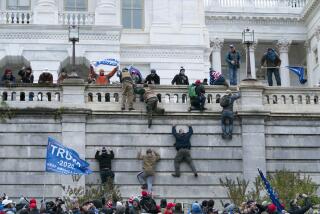COLUMN LEFT : A Hellish Life in ‘Democratic’ Guatemala : In this version of a capitalistic economy, the army always wins--whoever is elected.
- Share via
There is some irony in the fact that, at a time of declining public faith in U.S. electoral democracy, one of our growth industries should be the monitoring of democratic procedures in other countries. There’s always a team somewhere, it seems: one day Bulgaria, the next Pakistan. This week it’s Guatemala, which is holding a presidential election today.
Two basic yardsticks are commonly employed to judge the propriety of elections in a place like Guatemala. The first, often used by the State Department, stresses that this is the first orderly transfer of the presidency in years, without a coup d’etat or other messy interruption.
The second, more the preserve of the semiofficial election monitors, is concerned with the niceties of the vote. Americans are especially given to this kind of quantifiable research--whether pinkies or thumbs are dipped in the proper indelible ink, whether penalties exist to deter multiple voting and fraudulent registrations. After decades of watching soldiers load ballot boxes onto the backs of unmarked picked trucks and computers that mysteriously go down halfway through the count, these are understandable correctives.
In Guatemala, however, neither set of criteria is of much use. Election monitoring there is rather like conducting an autopsy and declaring the corpse to be healthy because you find no cavities in its teeth.
After today’s election, votes will be tabulated and a winner declared. Perhaps it will be Jorge Carpio Nicolle, a mediocre right-wing newspaper magnate who ran a distant second in 1985. Carpio was an early leader in the opinion polls after the enforced withdrawal of retired Gen. Efrain Rios Montt, Guatemala’s dictator in 1982-83, who was barred from running under a constitutional clause that prohibits the candidacy of anyone who has ever seized power violently.
But whoever is elected, the army gets in. Something Americans are slow to understand about Third World political elites is that they are excellent mimics. Even the Somozas and the Marcoses, in their own crude way, knew how to parrot the sweet language of democracy. The Guatemalan officer corps has learned that having the president wear a uniform may not be the best way of securing its long-term interests. Since the early 1980s it has come to see that the election of an ineffectual civilian in a clean vote, far from being a hindrance, may actually be a better cover than money could ever buy.
Still, it’s too easy to blame all Guatemala’s horrors on evil generals and naive or venal Americans. Outgoing President Vinicio Cerezo Arevalo is also responsible. A single adjective crops up constantly in discussions of the Cerezo presidency: “frivolous.” It’s an odd word to use about someone who survived three assassination attempts as a young Christian Democrat. But what Cerezo seems to have liked best about elective office was its perks--the cars, the country-house parties, the women. Recently he bought himself a little island in the Caribbean; Guatemala City gossip says he beat out pop singer Julio Iglesias in the bidding.
For other Guatemalans, the usual routines apply. Thanks to the economic austerity policies of the 1980s, thousands of children now live on the streets, the product of escalating misery. The latest pastime of the Guatemala City police is killing these kids--perhaps in the name of some deranged conception of law and order; perhaps just for kicks.
On Sept. 11 the anthropologist Myrna Mack was stabbed to death outside her office. She was the founder of the Guatemalan Assn. for the Advancement of the Social Sciences, which to the Guatemalan army is a little like saying you belong to the Society for the Spread of International Communism. Then on Oct. 25, gunmen opened fire on the journalist Byron Barrera, gravely wounding him and killing his wife. His newspaper, La Epoca, was firebombed into submission in 1988.
I mention these two cases not because they are especially unusual (there were 136 extrajudicial executions in September, an average sort of month), or even because I happened to know both Mack and Barrera professionally. I cite them because they show--to borrow some terminology from Eastern Europe--a state bent on extinguishing the breath of civil society.
This has been a year of celebrating the failure of communism and the spread of capitalist democracy to the entire world. But global systems deserve to be judged by their failures as well as their successes. For those who live in Guatemala’s version of a market economy, life is hell--whoever is president, and no matter how many voters dip their thumbs in the ink today.
More to Read
Sign up for Essential California
The most important California stories and recommendations in your inbox every morning.
You may occasionally receive promotional content from the Los Angeles Times.













